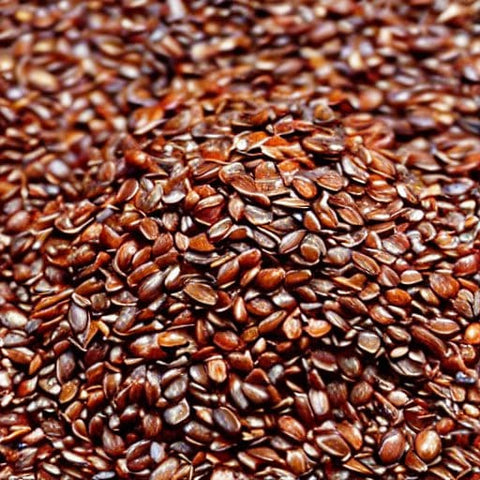Flaxseed is a Superfood That Has Many Benefits
Although flaxseed is very little and has the appearance of a typical seed, it is really a superfood that has numerous positive effects on one's health. It has a high concentration of omega-3 fatty acids, as well as fiber and antioxidants.
It may lower cholesterol levels, help one lose weight, and prevent one from developing cardiovascular disease, diabetes, and cancer. In addition to that, it has a high potassium content, which contributes to maintaining healthy blood pressure levels.
Advantages of flaxseed:
- Large Levels of Omega-3 Fatty Acids: Flaxseed is one of the finest plant-based sources of omega-3 fatty acids, which are essential for maintaining healthy heart and cognitive function as well as lowering levels of inflammation throughout the body.
- May Assist in Cholesterol Lowering: The soluble fiber found in flaxseed may assist in lowering cholesterol levels, which is critical for maintaining healthy cardiac function.
- May Help Control Blood Sugar: Flaxseed contains both fiber and healthful lipids, both of which have been shown to assist in the regulation of blood sugar levels. Because of this, flaxseed is an excellent option for individuals who have diabetes or who are at risk for getting the condition.
- High in Antioxidants: Flaxseed is an excellent source of lignans, which are powerful antioxidants that have been shown to inhibit the growth of cancer cells and ward off other illnesses.
- May Increase Digestive Health: The fiber found in flaxseed may help improve digestive health by encouraging normal stool motions and decreasing bloating. Flaxseed is a source of omega-3 fatty acids, which are known to improve digestive health.
- May Help with Weight Loss: Flaxseed has a low calorie count and a high fiber content, both of which can help encourage feelings of satiety and decrease total calorie consumption. This may help people who are trying to lose weight.
- Versatile and Easy to Use: Flaxseed is a handy way to add more nutrients to your diet because it can be readily incorporated into a variety of recipes, including soups, cereal, baked products, and other dishes. It is also very versatile.
Omega-3 Fatty Acids
The seeds of the flax plant (Linum usitatissimum) are one of the best sources of n-3 alpha-linolenic acid (ALA), which is a form of omega-3 fatty acid that is critical to the maintenance of human health. In addition, they are a source of lignans, antioxidants, and fiber, all of which are beneficial to one's health.
The body changes ALA into the more powerful n-3 fatty acids known as eicosapentaenoic acid (EPA) and docosahexaenoic acid (DHA). EPA and DHA are both derived from ALA. These longer-chain n-3s have a greater anti-inflammatory and health-promoting effect, particularly on the cardiovascular and nervous systems.
Eating foods that are high in ALA may help cut down on the amount of n-6 fat that is stored in your body, and it also has the potential to enhance your cholesterol levels. According to the findings of a research that was conducted over the course of a year, participants who had three servings of flaxseed each day had an 8.5% reduction in their LDL cholesterol levels when compared to a control group.
In addition, ALA may also reduce blood pressure by enhancing the way your heart operates and by assisting in preventing white blood cells from adhering to the inner linings of blood vessels. Both of these effects may have the effect of lowering blood pressure. This may help avoid blocked arteries, which is a risk factor for cardiovascular disease and may lead to a heart attack or stroke.

Your body's sensitivity to the natural anti-inflammatory benefits of ALA may be improved as well as your capacity to control blood pressure by following a diet that is high in n-3 fatty acids and includes whole ground flaxseed as one of its components. Additionally, it may lower the chances of you having autoimmune illnesses as well as cancer.
There is some evidence that consuming flaxseeds on a regular basis may assist in the treatment and prevention of both constipation and diarrhea. This is due to the fact that ALA has been shown to have the potential to increase the production of saliva and tears, both of which may help alleviate discomfort in the gastrointestinal tract.
These nutrients have also been shown to alleviate some of the signs and symptoms of Sjogren's syndrome, an autoimmune disorder that leads to dryness of the eyes and other organs. In addition, there is some evidence that ALA may assist in reducing levels of C-reactive protein, a chemical that has been linked to elevated risks of cardiovascular disease as well as cancer.
According to the Dietary Reference Intake, or DRI, the recommended daily amount of ALA for males is 1.6 grams, while the recommended daily amount for women is 1.1 grams. In most cases, the amount of ALA that your body requires on a daily basis may be met by consuming one tablespoon of ground flaxseed.
Flaxseed is an excellent source of several minerals, including magnesium, zinc, copper, vitamin B-6, folate, and potassium, in addition to the n-3 fatty acids ALA, fiber, and lignans. Flaxseed is also rich in antioxidants. Additionally, it has natural phytonutrients and is a rich source of lutein, both of which are helpful to one's eye health and may assist in the prevention of cataracts.
Fiber
Flaxseed is a superfood that does not get nearly enough attention, yet it is loaded with many of the nutrients that are necessary for us to have a healthy life. It has a high concentration of phytochemicals, omega-3 fatty acids, fiber, and antioxidants. Additionally, it has a higher potassium content than a banana.
In addition, it has a low number of calories and cholesterol (about 2 grams per tablespoon), but it has a large amount of magnesium and protein. It is simple to include it in a diet that is balanced, despite the fact that it is an affordable source of nutrients of a good quality.
It is advised that adults consume between 25 and 35 grams of dietary fiber on a daily basis; if you add a modest bit of flaxseed to the food that you eat, you can easily accomplish this target. Aim for one to two teaspoons of flaxseed, either whole or ground, every day.
This superfood may assist you in losing weight, enhancing your digestion, and enhancing the health of your heart. Additionally, it may assist you in avoiding cancer and lower the probability that you will get other chronic disorders.
Consuming foods high in dietary fiber helps to control the body's usage of sugar and maintains healthy blood sugar levels. In addition to that, it keeps you feeling full for a longer period of time and avoids constipation.
Many different kinds of plant foods, such as fruits, vegetables, grains, beans, legumes, and nuts, all contain fiber in varying amounts. To make sure you're receiving the appropriate amount of fiber in your diet, it's ideal to eat a well-rounded diet that contains a variety of foods from each of these categories.
Because it is able to soak up water in the digestive system, insoluble fiber helps to make stools more manageable and simpler to pass. By decreasing the rate at which you consume food, it may also make it easier to maintain a healthy weight.
On the other hand, soluble fiber behaves similarly to a sponge by soaking up substances in your digestive tract before those chemicals can be absorbed into your system. According to gastrointestinal (GI) expert and author Jennifer Zuckerbrot, who wrote The Complete Guide to Eating Clean, this lowers the likelihood that pollutants such as BPA, mercury, and pesticides would linger in your body for a sufficient amount of time to cause damage.
Insoluble fiber, on the other hand, absorbs water in the stomach and makes you feel fuller by making you feel more content with the food you eat. This contributes to the maintenance of regular bowel movements. People who suffer from gastrointestinal conditions such as irritable bowel syndrome or Crohn's disease can benefit tremendously from this in particular.
Lignans
Lignans, which are plant chemicals that function as anti-inflammatory agents and antioxidants, are abundant in flaxseed, which is an excellent source of lignans. These substances have been associated with a decreased likelihood of developing osteoporosis, cardiovascular disease, and cancer.
It has been shown that lignans, which are also known as phytoestrogens, may lessen the severity of menopausal symptoms such as hot flashes. They are easier on the body than hormone replacement treatment using synthetic hormones.
According to the findings of one research conducted on postmenopausal women who fed a diet that included flaxseed, the lignans included in the meal reduced the amount of urine estrogen metabolites. This led to a decrease in the frequency of hot flashes as well as an improvement in the health of the hair.
Flaxseed is an excellent dietary source of lignans, in addition to the essential fatty acids DHA and ALA (a-linolenic acid), which it also contains. It has been shown that lignans may slow the development of various different kinds of malignancies, including breast, colon, and ovarian cancers.
Flaxseed contains o-3 fatty acids, which have been shown to help decrease cholesterol levels and maintain stable blood sugar levels. These polyunsaturated fats may assist to prevent heart disease by lowering the inflammation that may build up in the arteries and cause cardiovascular difficulties. This inflammation can cause cardiovascular problems.
Because these polyunsaturated fats, and especially ALA and DHA, are necessary for human health, it is imperative that you consume foods that are rich in polyunsaturated fats in order to meet your nutritional needs. Because the body does not generate these nutrients, the only way to get them is via the consumption of food or the use of dietary supplements.
Consuming a diet that is rich in both ALA and DHA has been shown in a number of studies to be an effective method for lowering one's risk of developing cardiovascular disease, and more specifically coronary heart disease. These nutrients have also been found to reduce blood pressure and aid in the prevention of inflammation, both of which may contribute to cardiovascular diseases such as strokes and heart attacks.
According to the findings of other studies, people who have type 2 diabetes and struggle to keep their blood glucose levels under control may benefit from including flaxseed into their diets. One research found that diabetic persons who took a supplement consisting of 10 grams of ground flaxseed for a period of one month had a drop in their fasting blood glucose levels of 19.7 percent and a decrease in their hemoglobin A1c of 15.6 percent.
It has also been linked to greater prostate health in males if they consume a diet that is high in lignans that come from flaxseed. This is probably because of a bioactive compound called enterolactone, which comes from lignans and does the job.
Antioxidants
Antioxidants are naturally occurring compounds that combat free radicals, which are molecules in the body that are inherently unstable and have the potential to cause illness. Along with a variety of vitamins, you may discover them in a wide variety of fruits and vegetables.
Vitamins C and E are the two most frequent types of antioxidants. Antioxidants are essential to your body's defense against illness, including cancer, as well as the prevention and slowing of the indications of aging and protection against disease. They have also been shown to lessen the likelihood of developing heart disease and to assist in warding off strokes.
Lignans are a category of antioxidants that may be found in flaxseed. Flaxseed is a good source of lignans. It is believed that they may aid in the prevention of a wide range of illnesses, including prostate and breast cancer, cardiovascular disease, and inflammatory problems.
Lignans are also known to have the capacity to inhibit enzymes that are involved in the metabolism of hormones, which may aid in preventing the development of some malignancies. They can even inhibit the development of cancers and halt their progression.
In addition, lignans have been shown to enhance cognitive performance and boost energy levels. They may also be beneficial to the health of the eyes.
There is a significant quantity of a compound known as alpha-linolenic acid found in flaxseed (ALA). It is a kind of omega-3 fat that comes from plants, and it is thought to have a wide range of positive effects on one's health.
Incorporating flaxseed on a consistent basis into one's diet is the most effective method for reaping the benefits of the nutrients contained in flaxseed. Protein, fiber, and a variety of other critical elements may be found in abundant supply in the seeds. They may be included into a variety of dishes, including cereal, baked products, salad dressings, and others.
You may buy flaxseed that has already been ground, or you can make your own using a coffee grinder, blender, or food processor. During the milling process, the tough outer shell of the seed is broken, resulting in the release of a powder of a lighter color. This powder may be used with other foods to increase the health benefits of those foods.
Additionally, flaxseed is an excellent provider of a variety of other minerals, including magnesium, calcium, iron, and zinc, amongst others. All of these things are necessary for maintaining healthy bones, teeth, and skin. Additionally, a healthy immune system and cardiovascular system cannot function properly without them. The anti-inflammatory component known as C-reactive protein may also be reduced in blood levels by the ALA that can be found in flaxseed (CRP).


















































Leave a comment